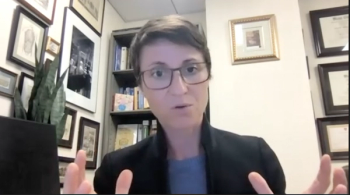
The FDA granted a priority review for a new supplemental Biologics License Application to Keytruda plus concurrent chemoradiotherapy for patients with locally advanced cervical cancer.

Brielle Benyon, Assistant Managing Editor for CURE®, has been with MJH Life Sciences since 2016. She has served as an editor on both CURE and its sister publication, Oncology Nursing News. Brielle is a graduate from The College of New Jersey. Outside of work, she enjoys spending time with family and friends, CrossFit and wishing she had the grace and confidence of her toddler-aged daughter.
Follow Brielle on Twitter @Brielle_Benyon.

The FDA granted a priority review for a new supplemental Biologics License Application to Keytruda plus concurrent chemoradiotherapy for patients with locally advanced cervical cancer.

When combined with Keytruda, the novel drug, NC318, proved to be safe and efficacious in treating advanced non-small cell lung cancer, research showed.

The FDA granted Welireg a priority review after it showed promising outcomes for patients with pretreated advanced renal cell carcinoma.

The FDA approved Ojjaara for intermediate or high-risk myelofibrosis, including primary myelofibrosis or secondary myelofibrosis (post-polycythaemia vera and post-essential thrombocythaemia), in adults with anemia.

Treatments intended to reduce biochemical recurrence in patients with prostate cancer may not improve long-term survival, recent research showed.

The phase 2 ARROS-1 trial will investigate NVL-520 in patients with pretreated ROS1-positive non-small cell lung cancer or other solid tumors.

Myelofibrosis-related anemia is different than anemia experienced by patients without a cancer diagnosis, a research nurse explained.

The addition of Tumor Treating Fields to standard therapy tended to improve overall survival in patients with pretreated metastatic non-small cell lung cancer.

In honor of Prostate Cancer Awareness Month, we looked back at some of our most viewed and significant prostate cancer content from the summer of 2023.

Here’s a look back at blood cancer approvals from the summer of 2023.

Here’s a look back at the therapies for solid cancers that gained FDA approval this summer.

Patients experiencing chemotherapy-related cognitive impairment may forget where they put things or even stop paying their bills, an expert said.

The Food and Drug Administration approved Reblozyl to treat low red blood cell count in patients with very low- to intermediate-risk myelodysplastic syndrome.

When asked for recommended treatments for certain types of cancer, ChatGPT missed the mark about one-third of the time, research showed.

Phase 3 findings showed that vorasidenib improved progression-free survival and time to next treatment in patients with IDH-mutant glioma.

The Oncologic Drug Advisory Committee will review data to determine if Lumakras should gain FDA approval for certain patients with KRAS G12C-mutant non-small cell lung cancer.

Patients with prostate cancer may have an inherited or acquired BRCA mutation, and both can have treatment implications, an expert said.

Prehabilitation can help patients become eligible for certain cancer treatments, or also help them recover from therapies, while also improving their overall health and fitness, an expert explained.

Patients with blood cancers who had limited social support tended to have poorer survival and a higher likeliness to be hospitalized, recent research showed.

The Food and Drug Administration granted a priority review to Tibsovo for the treatment of patients with IDH1-mutant relapsed or refractory myelodysplastic syndrome.

With multiple therapies available for patients with myeloma, there are some considerations that patients should discuss with their clinicians before choosing which one is right for them, an expert said.

The Hepzato Kit is a direct-to-liver therapy for patients with uveal melanoma with hepatic metastases.

Certain patients with penile squamous cell carcinoma responded to therapy with an immune checkpoint inhibitor, according to recent research.

A phase 1 clinical trial just launched and will test the novel agent, CLN-978, for relapsed/refractory B-cell non-Hodgkin lymphoma.

The ongoing chemotherapy shortage is preventing some clinical research from happening, resulting in both short- and long-term implications for cancer care.

The FDA granted an accelerated approval for Talvey to treat patients with relapsed/refractory multiple myeloma.

Artificial intelligence platforms such as ChatGPT are offering patients a more personal and conversational way to research their cancer, an expert said.

Patients with myelodysplastic syndrome should seek an expert opinion on their disease to ensure an accurate diagnosis and proper treatment plan.


Many patients with skin cancer who were treated with immune checkpoint inhibition experienced long-term side effects, although some resolved over time, research showed.